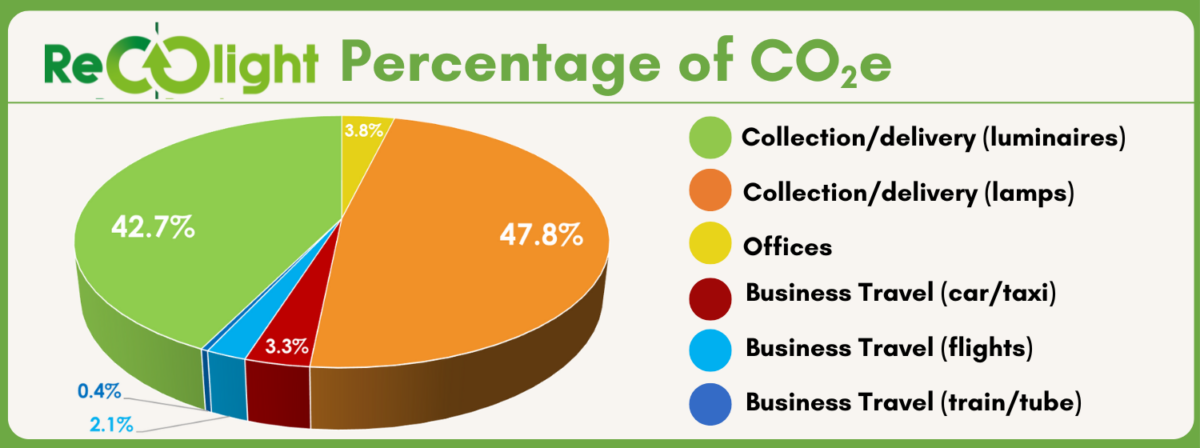Update on achieving the Recolight Net Zero target
Back in 2021, Recolight set a target to be net zero by 2030. And we also said that we would not use carbon offsets. To keep our focus on this most essential of targets, we also agreed annual carbon reduction targets.
So how have we done? In truth, not as well as we wanted. And to understand why, we need to consider Recolight baseline emissions (2019 data):

This shows that 90.5% of Recolight emissions are caused by the transport of waste lamps and waste luminaires.
Those transport movements are undertaken almost exclusively by diesel HGVs, which have only very limited low carbon alternatives.
For 2022 our performance showed a marginal increase in carbon emissions per tonne of waste collected.
So what more have we done to reduce our emissions in 2023/24?
- Our IT systems now automatically monitor transport carbon emissions for waste lamps, and waste luminaires.
- We have changed our service provision to limit the number of next day and short notice container deliveries and collections, which almost always resulted in a dedicated vehicle movement for that one job.
- We educate and encourage collection points to stack containers well, and to only request a collection when the container is full.
- We try to collect all containers on site in one movement. Our IT system alerts us if a site has additional containers that have not been requested for collection.
- We provide multiple containers to distant and high volume collection points, so that one vehicle movement can collect multiple containers.
- One of our logistics providers, PGS, now have an eHGV which is charged using their own solar panels. We are seeking to use that for trunking loads of full containers to Balcan, one of our waste lamp recyclers.
Those changes helped us achieve a 6.9%[1] reduction in waste transport emissions/tonne of waste collected in 2023, against an annual target of 10%. But we are unlikely to be able to repeat that reduction in 2024.
Policy changes
We have implemented a number of other general policy changes, as a part of our commitment to reducing emissions and a circular economy:
- Our policy of automatically replacing laptops and phones every 3 years has been dropped. We now replace only when necessary, and specify refurbished laptops not new.
- Net Zero reduction criteria are included in our recycling and logistics supplier tender documents. Suppliers are scored based on these criteria, and those who demonstrate better carbon reduction methods receive a higher score.
- Staff do not fly on company business, and we encourage travel by train or EV hire.
- The conferences and workshops we run are all paperless, and only offer vegetarian/plant-based food (which has much lower emissions than meat)
- We have changed our bank from HSBC, which is one of Europe’s largest financers of fossil fuel projects, to Lloyds and NatWest, both of which have much lower exposure to fossil fuels.
- Our staff have options for choosing pension investments which do not have exposure to fossil fuel companies.
So, it seems unlikely that we will meet our 2030 target. But we will not change our target. Adjusting sustainability targets before they are achieved to disguise inaction is now known as “Green Rinsing”. At Recolight, we will stick to the target, do our best to achieve it, and be upfront and honest if we can’t.
[1] This is better than previously reported at the Net Zero Lighting conference in May this year. We changed the calculation method in our IT system, because we discovered it was not taking into account the carbon savings associated with collecting multiple containers at the same time, using the same vehicle, from the same location.

